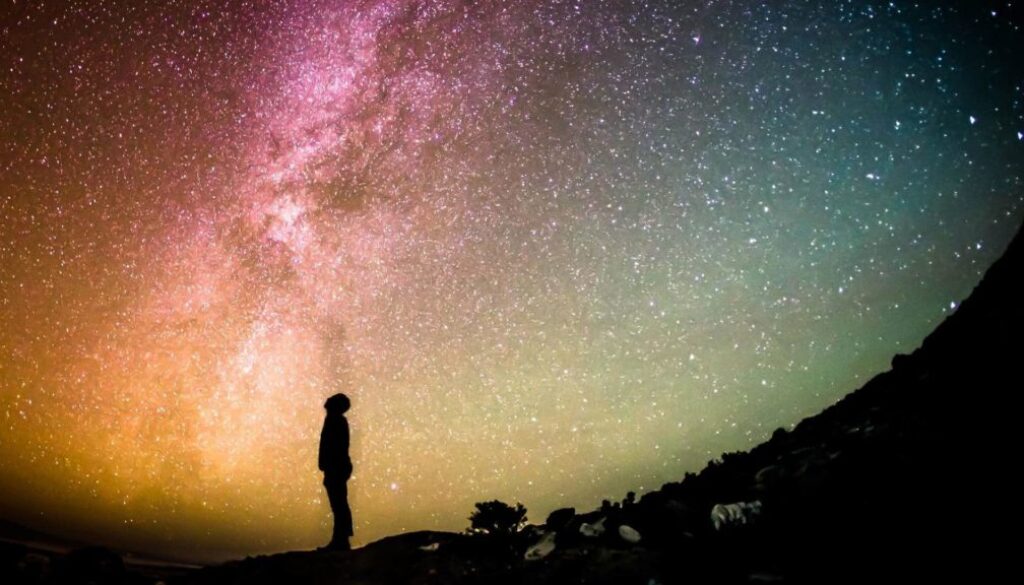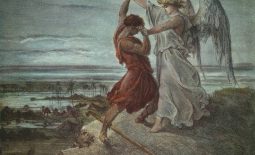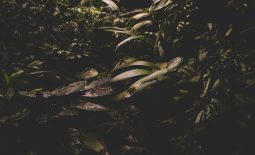The Beginning of Blessing
By Rabbi Esther Hugenholtz
Tonight is Rosh haShanah, ‘HaYom Harat Olam’ – the Birthday of the World. Let us start with Creation.
The Rabbis of the Talmud believed that the Cosmos was built up from the Hebrew alphabet, like a poetic, yet unscientific rendition of Democritus’ atomic theory. Each Hebrew letter codes for an aspect of Creation, weaving the primordial Torah into all Being. According to this Midrash, the letters all lined up, starting with the last letter of the Hebrew alphabet, the Tav. Each letter was given its positive attribute and its opposite, until it was the turn of the letter Bet – the second letter of the aleph-bet. It was decreed that the Bet stood for ‘b’rachah’, blessing. On account of the Bet’s unique status as a source of blessing, the Aleph was called to wait its turn and decided to go silent. The Aleph’s humility would later be rewarded by its inclusion at the utterance of the Ten Commandments, starting with ‘Anochi Adonai Eloheicha’, ‘I am the Eternal, your God’.
I was particularly struck by the idea of Bet as a source of blessing. The letter Bet that is forward-facing and open, from which all creation and potential flows. The Bet of B’reishit bara Elohim et haShamayim v’et ha’Aretz, ‘In the beginning, God created the Heavens and the Earth’. What a powerful, transformative idea that the beginning of all things is a blessing of all things.
If only we could take that teaching with us and inscribe it onto the tablets of our heart.
Erev Rosh haShanah is a perfect time to contemplate beginnings and blessings, and endings, of course, as we bid goodbye to 5778 and welcome in 5779. For my family and myself, beginnings, blessings and endings have been intimately woven into our lives this past year. It is little over a year ago since we arrived and since I stood here on this bimah as your new Rabbi. This community has welcomed us open-heartedly in Iowa City. Your generosity, kindness, good humor and curiosity have been instrumental in the continued process of building our sacred relationship. I have been blessed, honored and privileged to hear your stories, share your experiences and become part of your lives. This year has been a year of many things; of weddings and funerals, of welcoming new Jews and bonding with long-standing members. Of listening and supporting, of learning, adjusting and adapting, of innovating and experimenting and relying on your graciousness and kindness in doing so.
I have brought new and strange tunes on the guitar to the congregation, different types of learning and new spiritual sensibilities. At my Monday Meet-Ups I’ve been privileged to sit with many of you and share your joys and concerns. Inspired by the NewCAJE Educators Conference, the Hebrew School Principal and myself have started implementing innovations in our Hebrew School program. I’ve been privileged to unlock Jewish meaning for our B’nei Mitzvah students (a bumper crop this year!), bonded with them and see their concern and passion for their world and Jewish identity. I brought members closer to their Judaism and new Jews under the wings of the Divine Presence with our successful Introduction to Judaism program. We are at the start of launching a Shabbat Club for young families and their children under the leadership of our ever-creative Hebrew School Principal, Sonja Spear, who has worked hard to include our youngest members. We have instated a play corner for our under five’s so that they can soak up the melodies and emotions of our liturgy as they quietly play in the sanctuary. Under the thoughtful and wise leadership of our President, Kathy Jacobs, our Board has continued working on long-term plans to guarantee not only the survival but also the thriving of our congregation. We have instated a brand new inclusion committee to audit our synagogue and make it a more welcoming place celebrate the diversity of the Divine Image. We have had our first Gender-Non-Conforming Brit Mitzvah, opening up space and dialogue for our LGBTQ members. We have a new website and set up the Second Century Fund to secure legacies for the future.
I have also been blessed to represent Iowa Judaism proudly and uncompromisingly in the larger Jewish context, especially when confronted with a touch of bi-coastal skepticism. I’ve visited communities in Chicago, Boston, Atlanta and Indianapolis. I have engaged in rabbinic teaching at Limmud Chicago, represented the congregation in three national and international Jewish publications (the Jewish Telegraphic Agency, the Forward and the Jerusalem Post) with stories about the Ottumwa Synagogue, B’nei Jacob, their gift of Torah scrolls to other communities including our own and with an interview about the compelling argument for dual affiliation.
Perhaps most meaningfully to my family and myself is that we’ve opened our home – and will continue to do so – to practice and model the mitzvah of hachnassat orchim, the welcoming of guests. We look forward to having more of you around our Shabbat table over the next coming year and engaging us all in deeper ways to build community by opening each other’s homes and hearts. My heart has been full this year and all these engagements have helped me hone my rabbinic vision for a vibrant, viable, Midwestern Jewish life.
While all this has gone on, it is important to recall that every letter is part of Creation, every moment has its blessing—and its opposite. Some things may work, some things may not and we are called in this covenantal relationship to hone our vision for the community together.
There is a paradox about being a Rabbi, and all the more so when you’re a new Rabbi. Last year, my heart was bursting at the seams with excitement and the sheer joy of being here. This year, like any long-term relationship, my response is more steady, more measured, more mature, more real and more vulnerable. I have lived through this year with you all. I have come to know America on a deeper, more visceral level and my love for her has matured. I have been confronted by my own ignorance and embraced the sacred humility of not knowing and not understanding this culture and its complex history and fraught present. I have been afraid to speak truths without fully grasping the context, of either inciting or acquiescing, of bringing the wisdom of our Torah and the compassion and mercy of our God to bear on complex social situations. For many of us, myself included, this year has been a frightening and unsettling experience and it is all the more important that we as a community hold each other and hold this space during these turbulent times. This is the season to challenge our assumptions, to rise above our prejudices and to act bravely when bravery is called for and to serve compassionately and bring healing. As your Rabbi, I have endeavored to bring you my own unique Torah as well as speak on the pressing moral issues of our age and I have asked deeper questions than I ever have about the American experience and all of our roles in it, native born and immigrant alike.
Since the day I was ordained, I’ve loved being a Rabbi. I feel called and purposely fulfilled in this vocation, which is such a b’rachah, blessing. The congregational rabbinate challenges us to grow in so many directions and to invite a community – our community – into a rich conversation in who we are and what we inspire to be.
So it’s only appropriate for me to count my b’rachot in this sermon. Thank you for being sacred partners in this great project called Judaism. Thank you for your kindness. For sharing your lives, dreams, loves and losses with me. Thank you for teaching me and helping me integrate into my new homeland. From root beer floats (jury is still out on that one) to the Iowa State Fair (piglets are cute!), I have loved getting to know the lay of the land, to balance on the cusp of town and country and to relish in the rich blessings of that experience. Thank you for accepting and embracing me as your Rabbi. I couldn’t be partnered with a better community that yourselves.
Of course, I would be remiss if I didn’t thank our wonderful, diligent Synagogue President, Kathy Jacobs who has been a source of constant support and counsel, as well as our Emeritus Rabbi. Rabbi Jeff Portman quietly offers me his deep wisdom and unreserved friendship. I couldn’t have wished for a better, kinder, more considerate Emeritus Rabbi and I look forward to seeing our relationship deepen over the years.
I chose the theme ‘Veyeheh B’rachah’ – ‘Be a Blessing’ for this High Holiday cycle because blessing is what the world needs from us right now – as well as what we what we need from ourselves and each other.
I started reflecting on the call of Abraham to his mission in Genesis Chapter 12. ‘Lech lecha me’artzecha mimoladet’cha umiveit avicha el ha’aretz asher ar’echa… veyehey b’rachah’ – ‘go into yourself, from your homeland, from the place of your birth, from your father’s house… to a land that I will show you, and you shall be a blessing.’ Last Rosh haShanah, I spoke on the typology of our patriarchs and matriarchs. I wanted us to reach deeper into some of those ideas, of reading ourselves back into the Biblical narrative, of letting the story flow through our arteries, for its rhythms to become part of the beating of our heart. In last year’s sermon, the character of Abraham was framed on the basis of Genesis chapter 14 where he is described as ‘ha’ivri’, the ‘boundary-crosser.’ I spoke the following words:
“Abraham was a boundary-crosser; it was in his very nature to be an iconoclast. He upends the norms of his time and culture and is in perpetual transition. Abraham doesn’t get comfortable: he places justice and righteousness at the forefront of his religious consciousness… The Abraham who is called ‘to go forth’, who challenges God to not destroy the innocent alongside the wicked, is ‘ha’Ivri’. How can we be more like Abraham? How can we embrace our inner iconoclast, our inner sojourner, and stand up for the values we hold dear as Jews?”
This year’s theme is which invites us not only to think of Abraham as an iconoclast but as a source of blessing. What Genesis chapter 12 teaches us is that Abraham’s mission expands in circles of greater concern mirrored by the things he is called to leave behind. He is called to go into himself, leave his homeland, the place of his birth and his father’s house. He is called to go into the ultimate experience of vulnerability – to a land he has not yet seen – and be a blessing to the families of the earth. Abraham embarks on an existential journey of the self and we as the children of Abraham are called to complete this journey by being a light unto the nations. Over the course of Rosh haShanah and Yom Kippur, we will explore these things, from the particular to the universal, from the personal to the global, and how these High Holidays charge us with uncovering our own mission and find a deep and abiding sense of purpose in doing so.
Tonight is the birthday of the world, the ‘bet’ from B’reishit, the starting point of Creation, the first day of the rest of our lives, the b’rachah that we can pursue, embrace and model in our world. I am honored to be your fellow traveller.
Shanah tovah u’metukah, may God bless the work of our hands.




